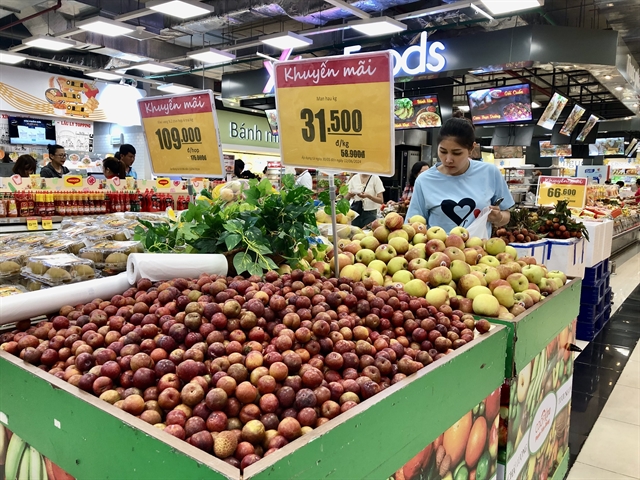 Economy
Economy

 |
| A consumer buys fruit at a supermarket. — VNA/VNS Photo |
HÀ NỘI — In the first ten months of 2024, Việt Nam’s fruit and vegetable imports reached nearly US$1.87 billion, marking a 15.7 per cent increase year-on-year. The surge in imports came from the US, Thailand and Myanmar, which rose by about 30 per cent, 31.1 per cent and 33.1 per cent, respectively.
In October, fruit and vegetable import turnover amounted to nearly $211.7 million, a 30.8 per cent increase year-on-year, according to the General Department of Customs.
The key suppliers of fruits and vegetables to Việt Nam during the first ten months were China, the US, Australia and Myanmar.
China remained the largest supplier, contributing $794 million, accounting for 42.5 per cent of total fruit and vegetable imports. Imports from this country increased by 21.2 per cent year-on-year, though a slight 4.6 per cent drop was recorded in October compared to September.
The US followed with $336 million, up by nearly 30 per cent, making up 18 per cent of total imports.
US agricultural products have increasingly reached Vietnamese consumers, including apples, grapes, oranges, cherries, pears, blueberries, peaches and nectarines.
According to the US Department of Agriculture (USDA), the US exported $3.1 billion in agricultural products to Việt Nam in 2023. Key products include cotton, soybeans, grains, nuts, wheat, poultry, dairy products and fresh fruits.
Currently, three types of US fruits, including tangerine, lemons and plums, are in the negotiation process for official export to Việt Nam.
However, challenges remain as US fruits exported to Việt Nạm still face high import tariffs. Plums are subject to a 20 per cent tariff, blueberries 15 per cent and tangerines 20 per cent.
At the seventh Việt Nam - US Business Summit held last week, Prime Minister Phạm Minh Chính expressed hopes for the negotiation of a bilateral Free Trade Agreement (FTA) between Việt Nam and the US.
He also stressed the need to continue building a legal framework to promote economic and trade relations, creating more favourable conditions for businesses in both countries. — VNS




